How to clean a patio without a pressure washer – 6 quick and easy ways to get rid of dirt and grime for a gleaming outdoor space
Spruce up your patio without the need for a pressure washer
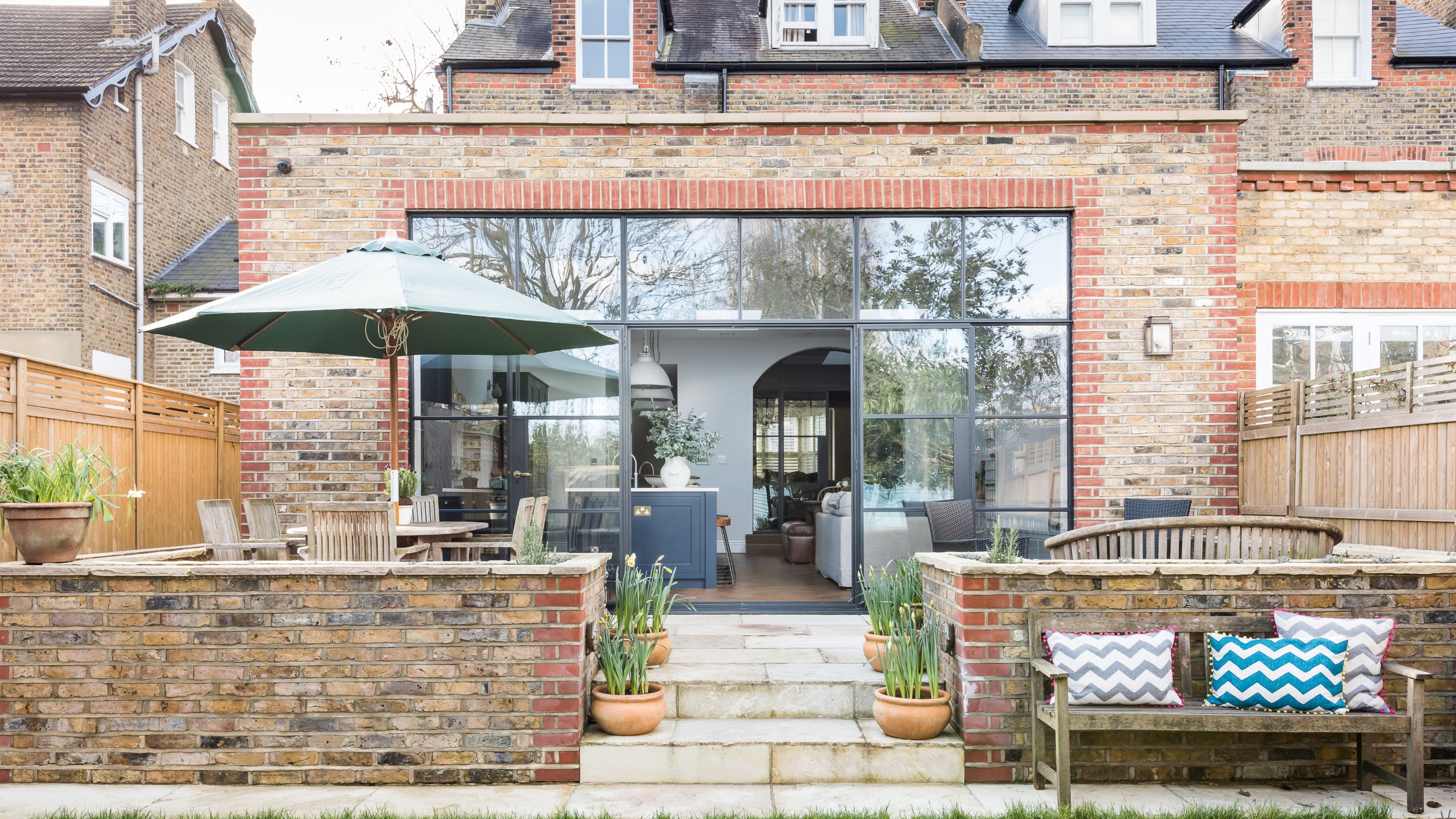

Jenny McFarlane
If your patio has taken a beating over the winter months and you’re looking to spruce it up before the sun comes out again, you might be interested in knowing how to clean a patio without a pressure washer.
While there’s no doubt that the best pressure washer can make cleaning a patio a breeze, what can you do if you don’t have one of these heavy-duty appliances to hand? Well, if you’ve let your envious neighbour borrow your pressure washer or you just don’t have the kind of cash to splash on such an appliance, there are so many ways to clean a patio without a pressure washer.
Whether your patio is covered in moss, stained with grime, or just looking a little tired after a long winter, these patio cleaning options, from cupboard essentials to more bespoke cleaners will do the trick and breathe new life into your old patio. In fact, you might not even recognise it by the time you’re done!
‘Wetter weather creates a breeding ground for algae and other organic growth, which can damage your patio. Using a power washer will visibly reduce its appearance temporarily, but it will soon return, plus this method exposes your stone surface, making it vulnerable to the elements, causing further damage - and it can also blast away your render,’ explains Martin Beaumont of Monty Miracle.
Adam Oldfield, Director of StovesAreUs advises to 'Start by sweeping away any debris with a brush. Avoid rakes as these can damage your tiles.'
'Once the debris is cleared away, look for stains on the tiles and tackle these next. The good news is that cleaning these stains can be very simple and you can use household products you’ll likely already have.'
So, check out these alternatives if you want to clean a patio without a pressure washer, with just a few simple tools and a bit of elbow grease.
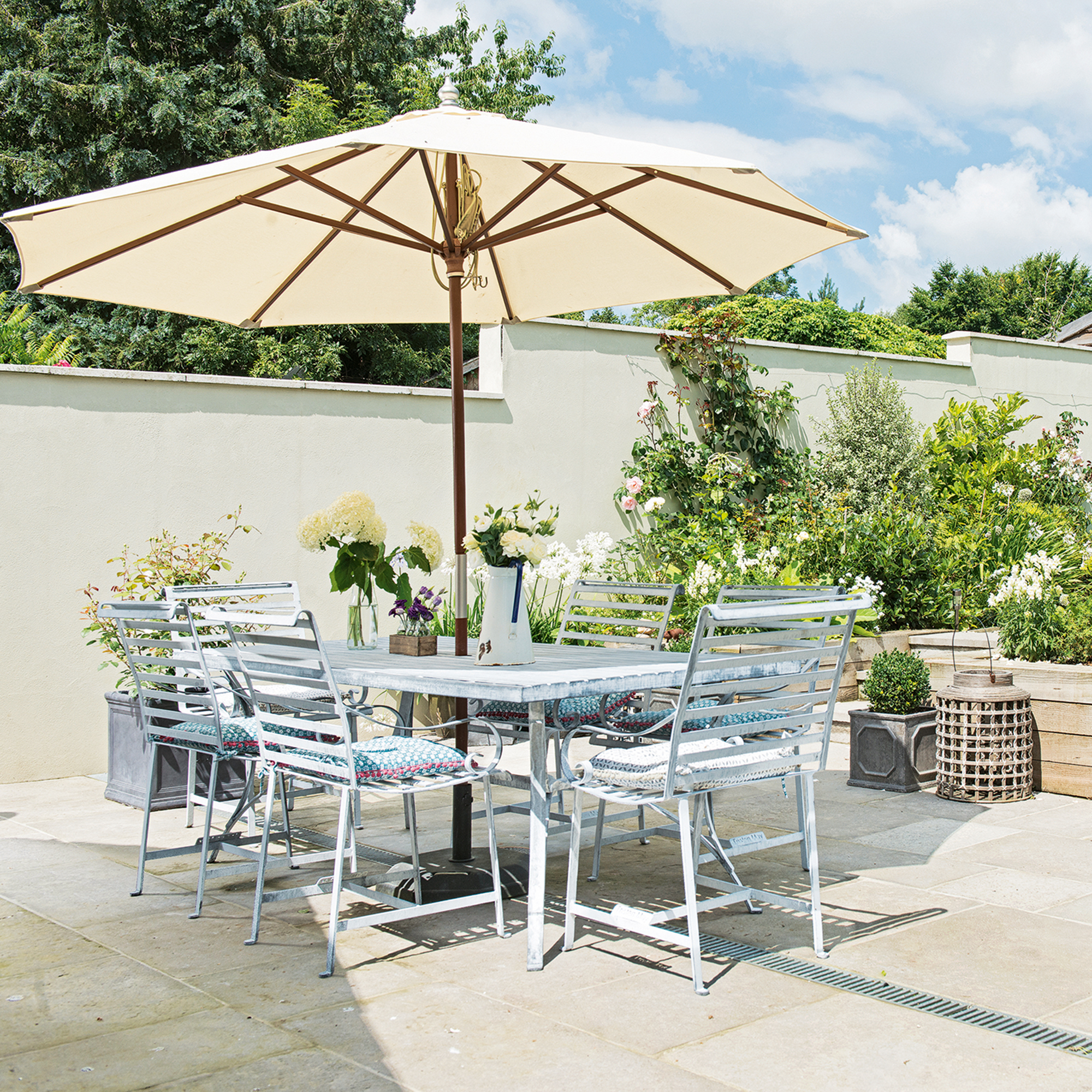
1. Use a dedicated patio cleaner
It’s not hard to find the best patio cleaners out there. So many products, like the top-rated Wet and Forget Mould, Lichen and algae remover which is available on Amazon, are specifically designed for this task, and almost all of them can be used without the help of a pressure washer. Usually, these are liquid chemicals that target the algae and remove black spots on your patio.
Talking about his patio cleaner (Monty Miracle Fast Patio Cleaner, which can be found on Amazon), Martin says, ‘The chemical liquid solution is simply applied to the surface and then left for ten minutes before rinsing - its unique formulation cleans away grime and grit without an invasive jetwash. A garden hose rinses away the solution with no need to apply any brute force or scrubbing.’
As they are specifically designed to clean a patio without a pressure washer, these chemical cleaners will make your patio look as good as new in no time. However, chemical cleaners aren’t the only option on the market - especially if you’re looking for something a little more natural.
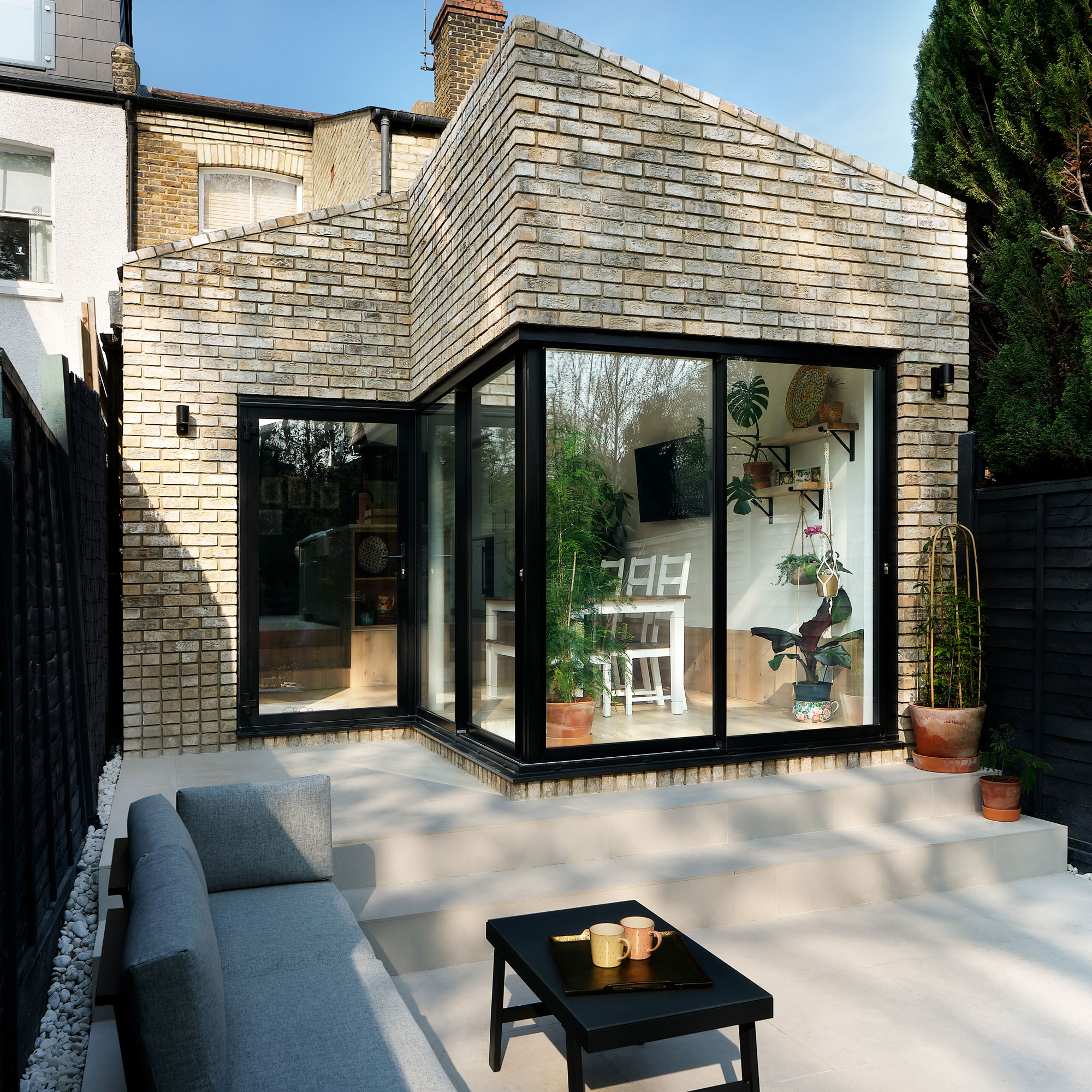
2. Use washing-up liquid and water
What you'll need
- A stiff brush - this heavy duty brush available at Amazon will be handy for multiple jobs in the garden year-round
- Washing up liquid - dependent on the size of your patio, consider bulk buying Delphis eco friendly liquid at Amazon
- Hot water
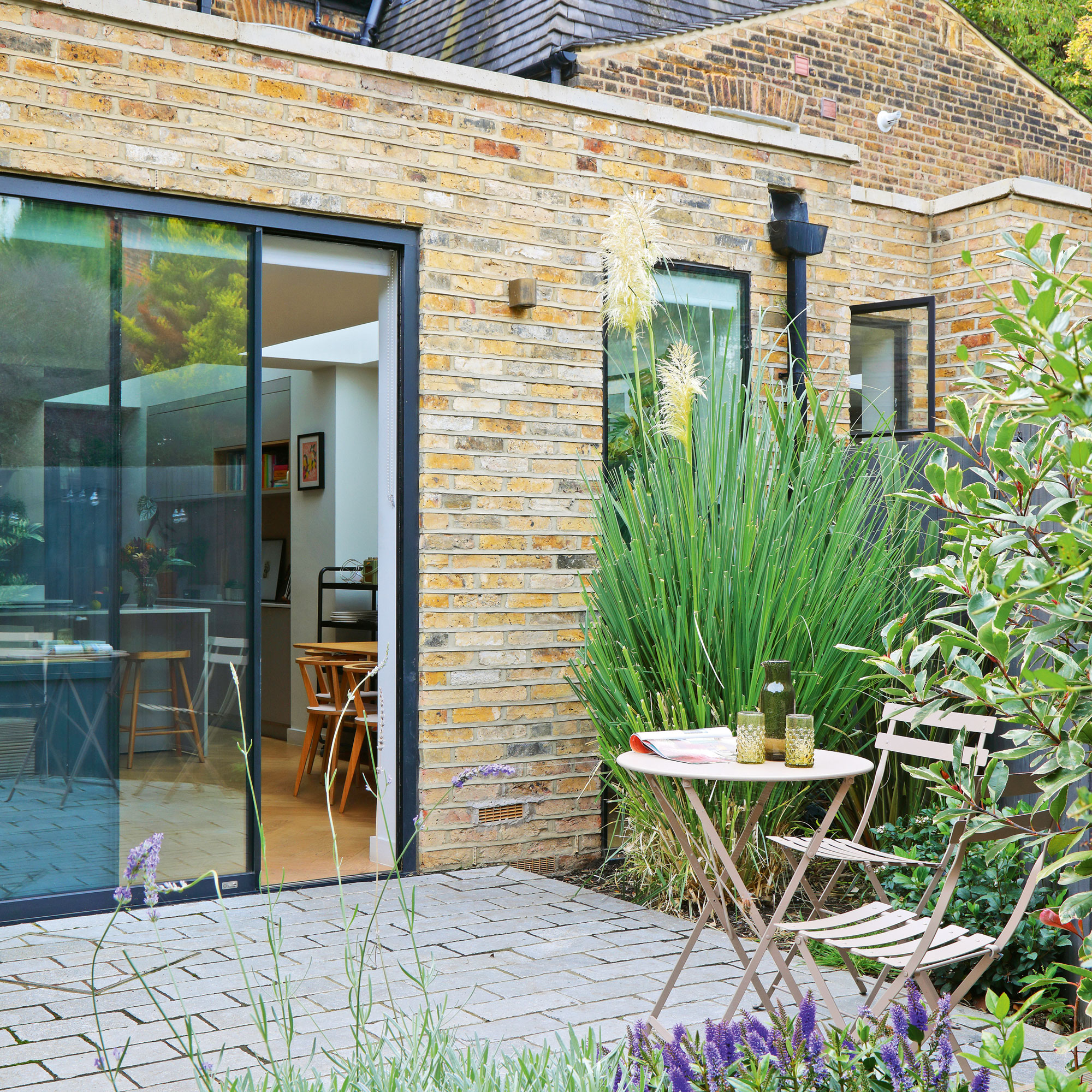
Whether you're opting for a general clean or looking to prepare your patio for winter, you should never underestimate the power of washing-up liquid and water. Sometimes, the simplest of products can make the biggest difference, and that’s why some experts swear by using washing-up liquid and warm water to clean a patio without a pressure washer. In fact, it may be worth installing an outdoor hot water tap for this.
Steven Bell, the managing director of Paving Shopper, explains, 'Washing up liquid mixed with warm water makes an excellent patio cleaner because it is designed to dissolve oil and grease. Create your own soap solution by adding a few squeezes of lemon-scented dish soap or washing up liquid to a bucket of warm water. The citrus smell is an added bonus! Scrub the sudsy mixture over the entire area with a stiff cleaning brush (try this heavy duty brush available at Amazon), then rinse clean.'
'Once you have washed your patio, you will want to check all joints to make sure none of the jointing material has been washed out or loosened. If it has, you will want to re-sand or re-point any of the affected joints,' explains Trevor Knight, technical garden and driveway specialist for Marshalls Plc.
So with that in mind, aim to scrub diagonally when you do this, so you don’t disrupt the jointing compound. Of course, this option will require a lot of manual labour, but it’ll definitely be worth it.

With over 23 years of hands-on experience at Marshalls, there aren’t many things that Trev doesn’t know about their product range - from patios to driveways, to the vast commercial range all the way to drainage solutions. Trevor has wide experience in all areas of the Marshalls Group - including new product development, heading up the Marshalls internal installation team and show garden teams for the RHS show gardens from Chelsea to Tatton to Holker and beyond.
His awards include, RHS Chelsea 5 Star Trade Stand Winner, RHS Tatton Gold Medal & People’s choice Winner “Chrones Garden” Actual Landscapes, RHS Holker 3 Times Gold Medal Winner, Ultraframe National Construction awards 1st place 3 times winner, BBC Gardeners World Live exhibitor 4 times and RHS Hampton Court live exhibitor 3 times.
3. Use white vinegar
- White vinegar - A large 5L bottle of eco-friendly white vinegar like Miniml's unscented version available on Amazon is a safe winner
- A hard-bristled brush - this Bettina scrubbing brush available at Amazon is great to add a little extra elbow grease
- Hot water
Let’s be honest; cleaning with vinegar has revolutionised our lives. And while there are some things that you should never clean with vinegar, your patio is not one of them. This acidic ingredient is perfect for cutting through the algae and moss on your patio, and it can clean even the dirtiest of slabs.
'For an eco-friendly route, white vinegar naturally breaks down residue because its acetic acid cuts through mineral deposits and grease. Mix equal parts vinegar and water in a watering can, spritz liberally over the patio, let sit for 30 minutes, then scrub. Vinegar also helps kill weeds between pavers organically as you clean,' says Steven.
If you want to, you can then give it a wash and a slight scrub with warm soapy water, and then rinse. However, it’s important to note that you shouldn’t attempt to clean limestone patio slabs with vinegar, as this acidic ingredient may damage them in the process.
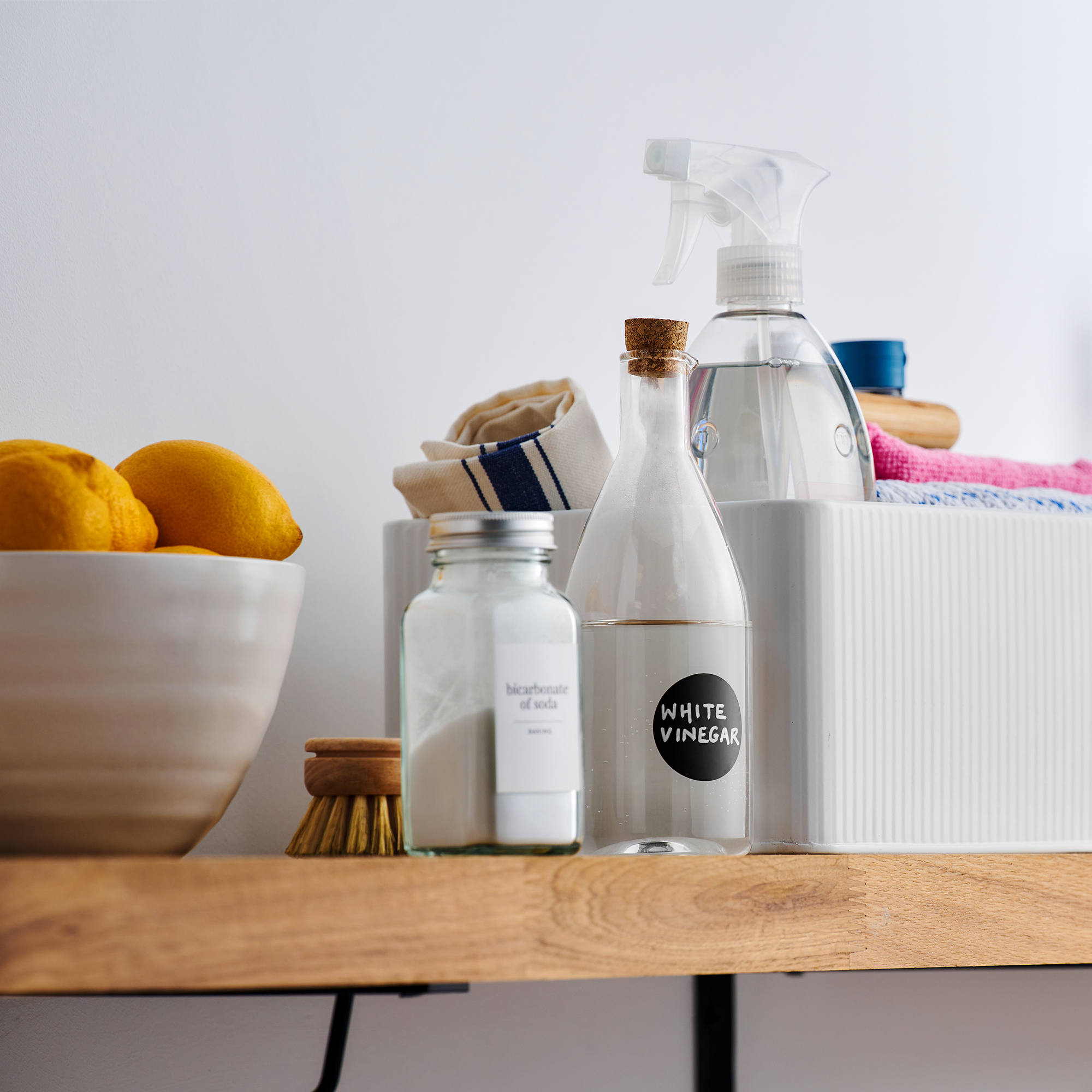
However, experts such as Trevor advises using vinegar with a huge dose of caution.
'Despite often being a popular choice for cleaning the patio, vinegar can harm the biodiversity of your garden,' warns Trevor.
'White vinegar solutions can damage and kill plants - this may be the ideal outcome for those wanting to rid their patio of weeds, however, if this solution were to make its way onto your plants and grass, the result would be less than desirable. The use of acidic solutions should be avoided, particularly on calcareous pavers such as those made from limestone. Use on these pavers can lead to irreparable damage of the material.'
4. Use baking soda
- Baking soda - Bag a big tub of baking soda like Hexeal's baking soda on Amazon so you have plenty to work with
- A scrubbing brush - this two-pack of hand scrubbing brushes with soft grip handles from Amazon will make the cleaning challenge a tad easier
- Hot water
As is the case with vinegar, there are certain things that you should never clean with baking soda. But once again, your discoloured patio doesn’t make the cut! Thanks to its mildly abrasive nature, baking soda is a great option for those looking for a natural way to clean their patio.
That’s because the baking soda will tackle the stubborn stains and dirt without damaging the patio slabs in the process, and to successfully do this you’ll need to make a paste of baking soda and water.
Then, scrub the mixture into the patio with a hard-bristled brush. You can then rinse the whole thing with water and repeat as many times as you need to.
5. Use Cif
It might not be a designated patio cleaner, but Cif is certainly a popular household cleaner. Of course, most people use it for the hobs in their kitchen or the sinks in their bathrooms, but it seems as though Cif can also work wonders outside of the house.
Laura Mountford, Cleaning Expert and Author of Live Laugh Laundry, explains, ‘For a deep clean, I like to use a cream cleaner like Cif and then scrub using a long-handled garden broom. This will help to remove stubborn stains.’
Of course, we’d also suggest rinsing your patio with soapy water after using a product like this. And if you’re interested in this option, you can buy this Cif Pack of 4 Lemon Cream Cleaner from Amazon.
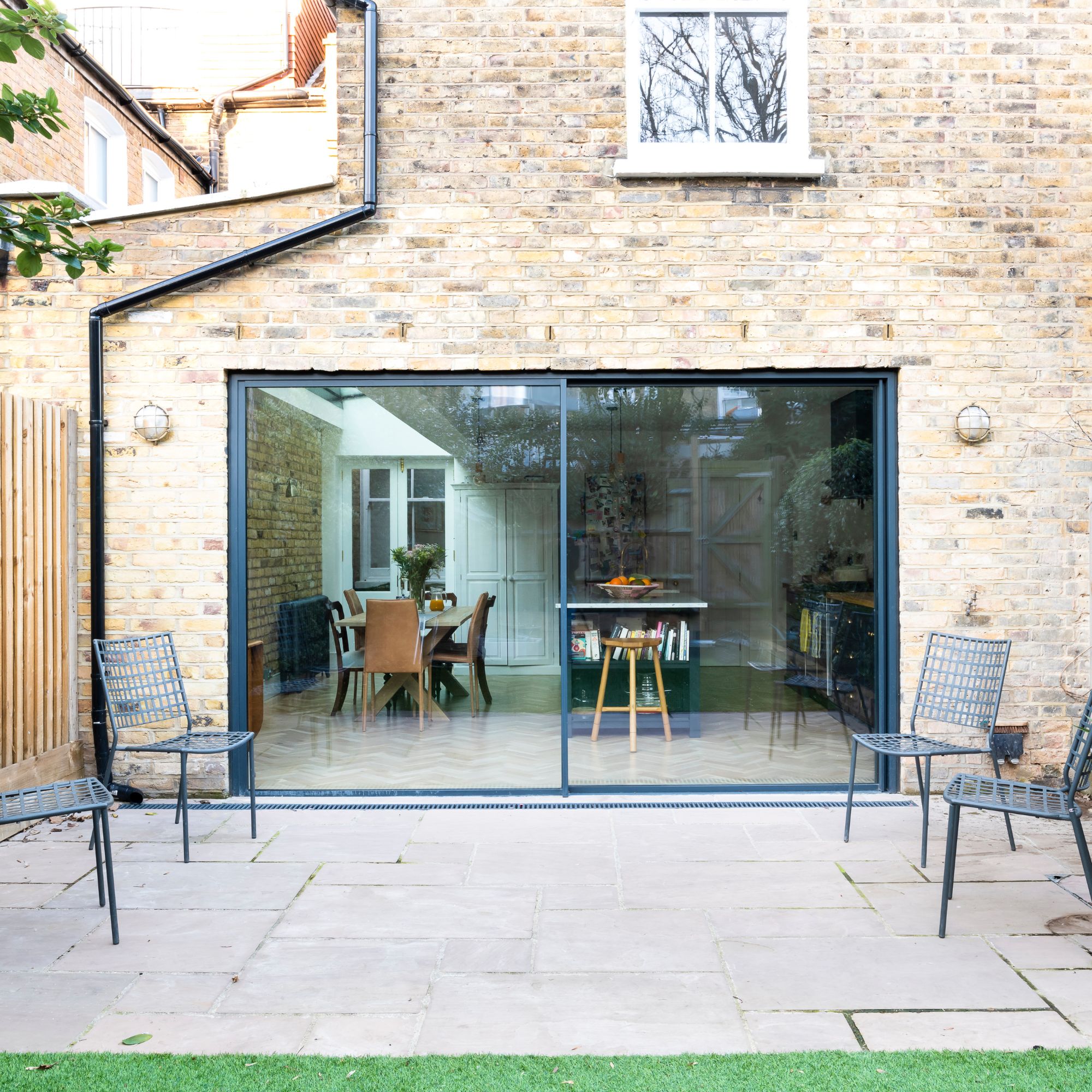
6. Tackle with a steam cleaner
If you've picked up one of the best steam cleaners to clean inside your home, you'll be surprised to know you can actually use it outdoors too.
Using a steam cleaner is particularly effective for targeting algae on your patio which is a particular bugbear as spring rolls in.
The main advantage of steam cleaning is you don't need to use any harsh chemicals which is better for plants and wildlife.
Use the hose attachment for specific areas like back spots or go for the brush to loosen more widespread ingrained dirt.
FAQs
What should you not use to clean a patio?
Trevor Knight, technical garden and driveway specialist for Marshalls Plc says that bleach is one of the worst things you can use to clean your patio.
'Similar to vinegar, bleach is harmful to plants and, therefore, can harm your garden’s biodiversity,' warns Trevor.
'Any bleach solution that runs off of the patio onto grass or plants when cleaning can cause significant harm to these, likely causing them to die. Over time, bleach can also lead to discolouration and irreparable damage to paving slabs, particularly those that are man-made such as concrete slabs.'
There you have it, there's no need to pressure wash with these methods in your back pocket. Well, only if you're not dealing with a mega cleaning job, in which case, a great pressure washer will come in pretty handy. Check out our favourite, Karcher's K4 Power control home pressure washer, available at Amazon.
Alternatively, Marshall PLC's technical garden expert Trevor Knight adds that 'if you’re considering a new patio, and you’re keen to spend the least amount of time on maintenance, you could consider using porcelain paving as it absorbs little to no moisture. This means that any detritus remains on the surface and is very much easier to clean and maintain.'
Happy cleaning!
Get the Ideal Home Newsletter
Sign up to our newsletter for style and decor inspiration, house makeovers, project advice and more.

Lauren Bradbury has been the Content Editor for the House Manual section since January 2025 but worked with the team as a freelancer for a year and a half before that. She graduated with a Bachelor’s degree in English and Creative Writing from the University of Chichester in 2016. Then, she dipped her toe into the world of content writing, primarily focusing on home content. After years of agency work, she decided to take the plunge and become a full-time freelancer for online publications, including Real Homes and Ideal Home, before taking on this permanent role. Now, she spends her days searching for the best decluttering and cleaning hacks and creating handy how-to guides for homeowners and renters alike, as well as testing vacuums as part of her role as the Ideal Home Certified Expert in Training on Vacuums, having spent over 110 hours testing different vacuum models to date!
- Jenny McFarlaneSenior Digital Editor
You must confirm your public display name before commenting
Please logout and then login again, you will then be prompted to enter your display name.
-
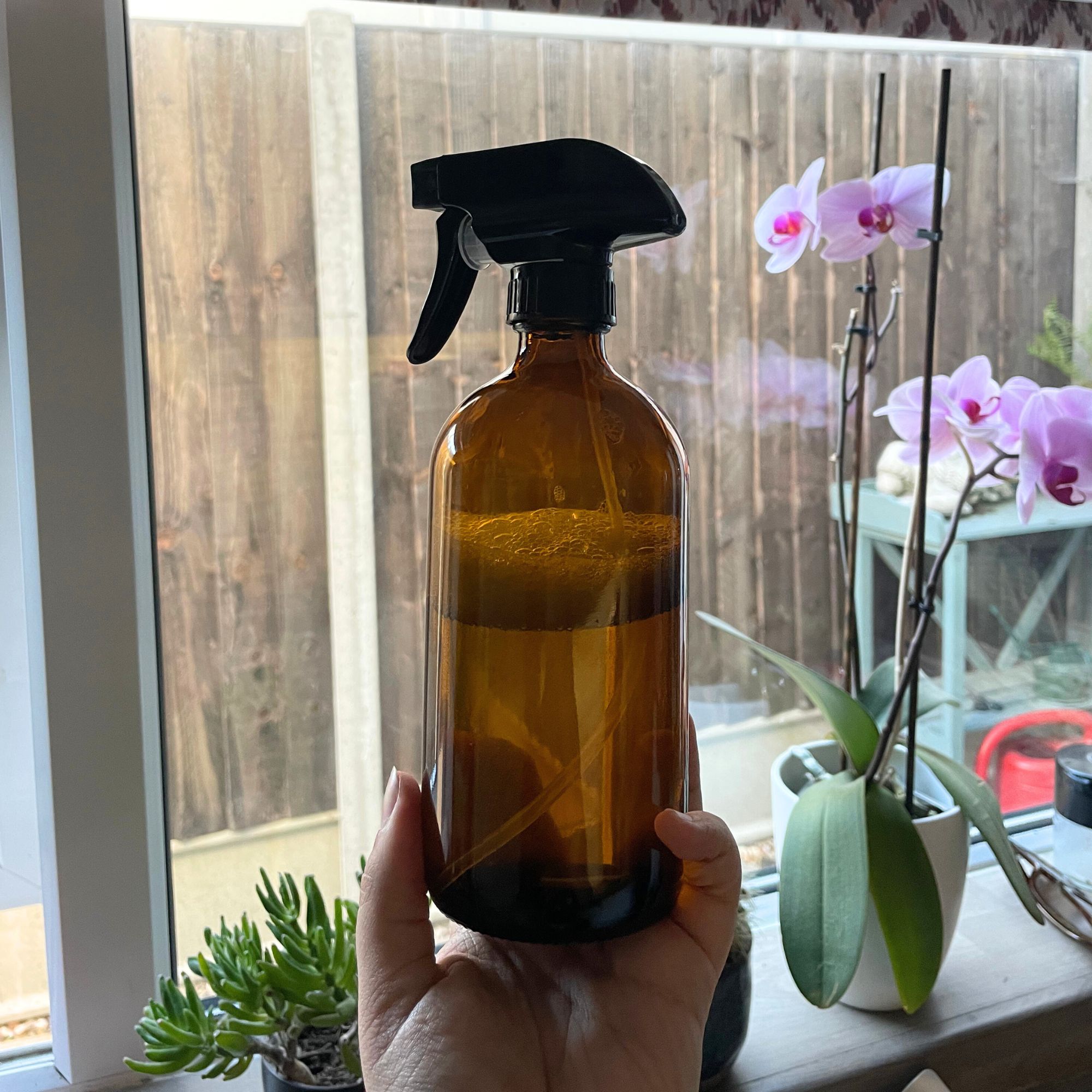 My mum introduced me to Nancy Birtwhistle’s ‘Pure Magic’ recipe - now I don’t think I’ll need to buy another cleaning product ever again
My mum introduced me to Nancy Birtwhistle’s ‘Pure Magic’ recipe - now I don’t think I’ll need to buy another cleaning product ever againI live in a hard water area, and it's the ONLY thing that's removed the limescale in my toilet
By Lauren Bradbury
-
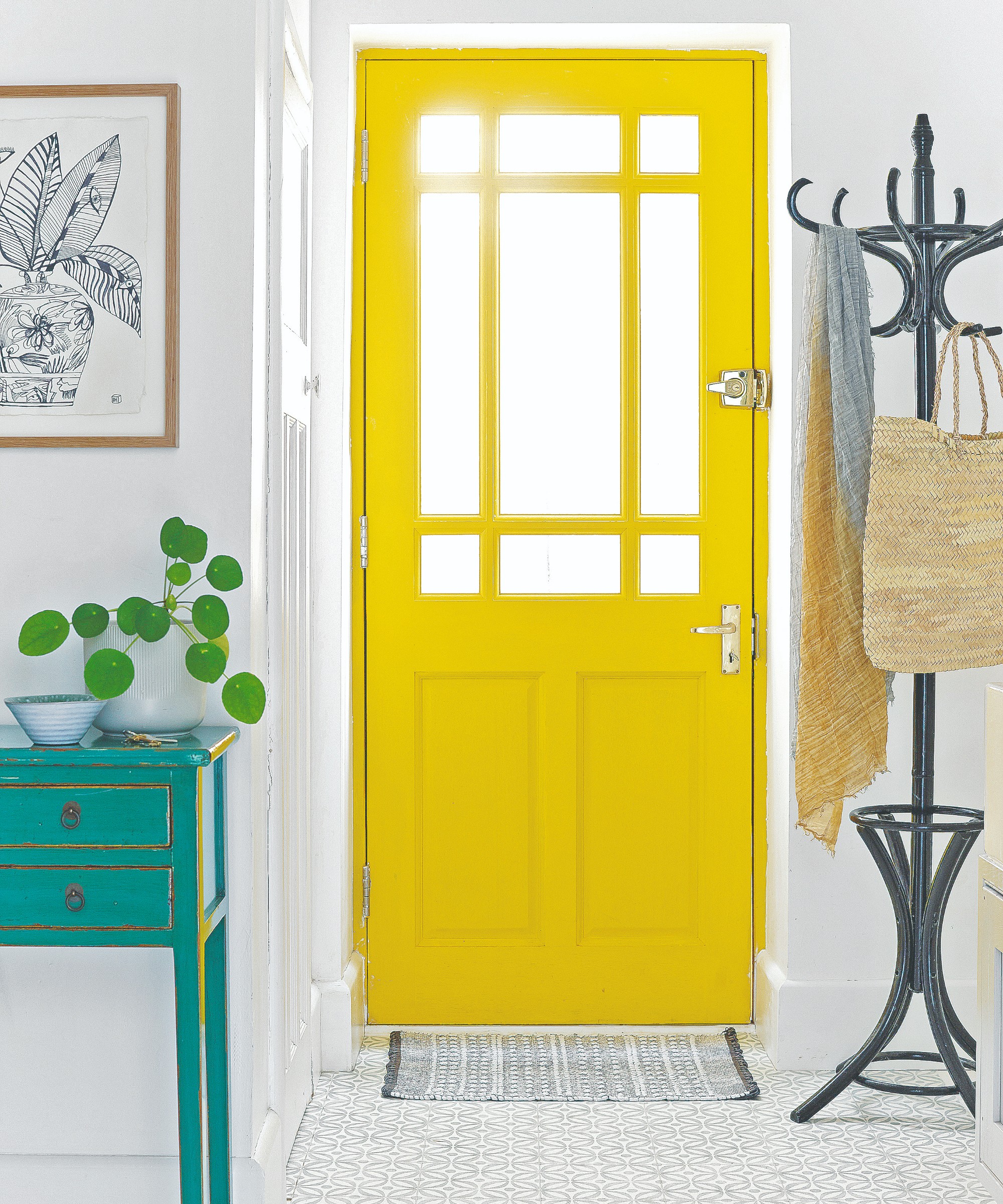 5 most welcoming colours to paint a front door, according to experts and colour psychology
5 most welcoming colours to paint a front door, according to experts and colour psychologySend out the welcoming vibes before the door is even open
By Ellis Cochrane
-
 How and when to fertilise peonies for bigger, brighter blooms, according to experts
How and when to fertilise peonies for bigger, brighter blooms, according to expertsFind out everything you need to know about fertilising peonies and how to boost their beautiful blooms for longer
By Lisa Fazzani